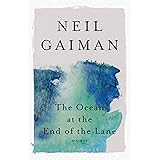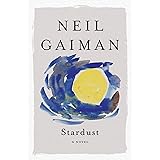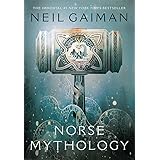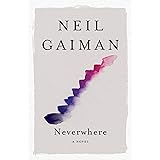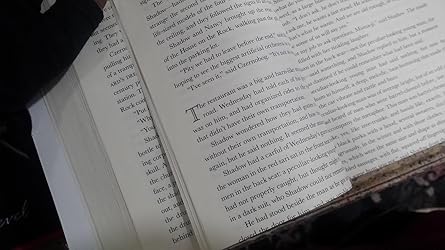
Download the free Kindle app and start reading Kindle books instantly on your smartphone, tablet, or computer - no Kindle device required.
Read instantly on your browser with Kindle for Web.
Using your mobile phone camera - scan the code below and download the Kindle app.

OK
 Audible sample Sample
Audible sample Sample 


American Gods Mass Market Paperback – April 1, 2002
Shadow is a man with a past. But now he wants nothing more than to live a quiet life with his wife and stay out of trouble. Until he learns that she's been killed in a terrible accident.
Flying home for the funeral, as a violent storm rocks the plane, a strange man in the seat next to him introduces himself. The man calls himself Mr. Wednesday, and he knows more about Shadow than is possible.
He warns Shadow that a far bigger storm is coming. And from that moment on, nothing will ever be the same...
- Print length624 pages
- LanguageEnglish
- PublisherHarperTorch
- Publication dateApril 1, 2002
- Dimensions4.19 x 1.56 x 6.75 inches
- ISBN-100380789035
- ISBN-13978-0380789030
- Lexile measure840L
The Amazon Book Review
Book recommendations, author interviews, editors' picks, and more. Read it now
Similar items that may ship from close to you
 “Gods die. And when they truly die they are unmourned and unremembered. Ideas are more difficult to kill than people, but they can be killed, in the end.”Highlighted by 6,967 Kindle readers
“Gods die. And when they truly die they are unmourned and unremembered. Ideas are more difficult to kill than people, but they can be killed, in the end.”Highlighted by 6,967 Kindle readers All we have to believe with is our senses: the tools we use to perceive the world, our sight, our touch, our memory. If they lie to us, then nothing can be trusted. And even if we do not believe, then still we cannot travel in any other way than the road our senses show us; and we must walk that road to the end.Highlighted by 5,862 Kindle readers
All we have to believe with is our senses: the tools we use to perceive the world, our sight, our touch, our memory. If they lie to us, then nothing can be trusted. And even if we do not believe, then still we cannot travel in any other way than the road our senses show us; and we must walk that road to the end.Highlighted by 5,862 Kindle readers Religions are places to stand and look and act, vantage points from which to view the world.Highlighted by 5,788 Kindle readers
Religions are places to stand and look and act, vantage points from which to view the world.Highlighted by 5,788 Kindle readers We do not always remember the things that do no credit to us. We justify them, cover them in bright lies or with the thick dust of forgetfulness.Highlighted by 5,199 Kindle readers
We do not always remember the things that do no credit to us. We justify them, cover them in bright lies or with the thick dust of forgetfulness.Highlighted by 5,199 Kindle readers He wondered whether home was a thing that happened to a place after a while, or if it was something that you found in the end, if you simply walked and waited and willed it long enough.Highlighted by 4,815 Kindle readers
He wondered whether home was a thing that happened to a place after a while, or if it was something that you found in the end, if you simply walked and waited and willed it long enough.Highlighted by 4,815 Kindle readers
Editorial Reviews
Review
American Gods is sexy, thrilling, dark, funny and poetic." (Teller, of Penn & Teller)
"American Gods is like a fast run downhill through a maze -- both exhilarating and twisted." (Jane Lindskold, author of Changer and)
From the Publisher
About the Author
Neil Gaiman is the New York Times bestselling author of the novels Neverwhere, Stardust, American Gods, Coraline, Anansi Boys, The Graveyard Book, Good Omens (with Terry Pratchett), The Ocean at the End of the Lane, and The Truth Is a Cave in the Black Mountains; the Sandman series of graphic novels; and the story collections Smoke and Mirrors, Fragile Things, and Trigger Warning. He is the winner of numerous literary honors, including the Hugo, Bram Stoker, and World Fantasy awards, and the Newbery and Carnegie Medals. Originally from England, he now lives in the United States. He is Professor in the Arts at Bard College.
Product details
- Publisher : HarperTorch; Reprint edition (April 1, 2002)
- Language : English
- Mass Market Paperback : 624 pages
- ISBN-10 : 0380789035
- ISBN-13 : 978-0380789030
- Lexile measure : 840L
- Item Weight : 11.2 ounces
- Dimensions : 4.19 x 1.56 x 6.75 inches
- Best Sellers Rank: #1,356,403 in Books (See Top 100 in Books)
- #10,718 in Folklore (Books)
- #20,932 in Fantasy Action & Adventure
- #33,368 in Paranormal & Urban Fantasy (Books)
- Customer Reviews:
About the author

Neil Gaiman is the #1 New York Times bestselling author of more than twenty books, including Norse Mythology, Neverwhere, and The Graveyard Book. Among his numerous literary awards are the Newbery and Carnegie medals, and the Hugo, Nebula, World Fantasy, and Will Eisner awards. He is a Professor in the Arts at Bard College.
Customer reviews
Customer Reviews, including Product Star Ratings help customers to learn more about the product and decide whether it is the right product for them.
To calculate the overall star rating and percentage breakdown by star, we don’t use a simple average. Instead, our system considers things like how recent a review is and if the reviewer bought the item on Amazon. It also analyzed reviews to verify trustworthiness.
Learn more how customers reviews work on AmazonReviews with images
-
Top reviews
Top reviews from the United States
There was a problem filtering reviews right now. Please try again later.
Gaiman's themes here are weighty, and they could drag off and drown your average narrative with their importance. Gaiman doesn't even try to fight this; he lets the book be tossed to and fro, gyrating wildly and leaping off into tangents in order to explore part after part of his post-mythology mythos. As such, though the story is interesting on its own, and the character's usually well drawn, this is more a novel about America and its synthesis than it is about anything else.
The gods were brought here by the immigrants (the Irish leprechaun upon ships during the days of famine; the pixies and their ilk from English prisoners; Odin from exploratory and bloodthirsty Viking longboats; the Egyptian pantheon of Anubis, Thoth, Horus, Bast settling in New Egypt; Anansi from - well, you get the idea) but things have changed, and, in the process of acclimatization, the believers became American, and the gods were cut loose. Now, as time moves on, their belief and traditions are fading fast towards zero, and the old deities are desperate to not simply drop out of existence.
Now, in this new world, the actual facets of the gods' being are no longer important, the funeral director gods of death are as on the verge as a New York City djinn, and all that still matters is where they came from and whether they still exist at all:
"'I have a brother. They say, you put us together, we are like one person, you know? When we are young, his hair, it is very blonde, very light, his eyes are blue, and people say, he is the good one. And my hair is very dark, darker than yours even, and people say I am the rogue, you know? I am the bad one. And now time passes, and my hair is gray. His hair, too, I think is gray. And you look at us, you would not know what was light and who was dark.'" (p. 79)
Simplification is not the only change brought on by the passage of years. The majority of Gods in the book fall into one of two pathways. The first try - in vain? - to recreate the glory days, always striving to remember. The world, however, has moved on, and their attempts frequently become depressingly comical, as they try to assert their dominance over a world that has forgotten them, such as Eoster, trying to claim that she's still beloved due to the name of the holiday. In many cases, being the American incarnation of these gods, they don't even have a period of power to look back upon, such as Czernobog who cannot even contemplate his days as a dark god anymore and is able to do nothing else but dream about his years in a slaughterhouse.
The other potential path is a darker one still, and it is one that we are introduced to at the end of the very first chapter: the perversion of everything that the god once held holy. The Queen of Sheba has become a prostitute. Even that, however, is not far enough. In a twisted incarnation of her need for belief, she forcers her forces her lovers to worship her and sexually devours them for sustenance. Her words hold true for her and for the array of similarly striving gods we glimpse in the narrative: "There is nothing holy in [my] profession. Not anymore." (p. 373)
But is the decline of the gods really such a bad thing? In one part of the story, we see a funeral home run by the Egyptian gods of death. They provide a more personal touch, a send off by something with more of a soul than the mechanical filling of orders provided by a big funeral company. In another subplot, we get to see a community still run and safeguarded by a supernatural being. The community's exterior is enticing and gleaming, which hides the sacrifice needed to maintain it.
Is such a thing worth it for a more ordered world? Has our modern world of machines and computers destroyed wonder and human contact? It's impossible to truly a question like that, and Gaiman doesn't. American Gods is not a narrative of answers, but rather a tapestry of questions. You will never get a definitive answer of how the gods interact with mortals; you will never know whether the old gods were right to fight for their survival; you will never know whether the gods will one day be gone completely. But you don't need to know. In American Gods, Gaiman asks the questions, and I think that every reader will have their own answers.
The sprawling nature of the themes, and the narration's tendency to leap after them wherever they may go, leads to an incredibly meandering text. Our main character Shadow, who is roped into the conflict as the assistant to Mr. Wednesday only hours after leaving prison. While it seems, at first, that the two are working towards a definite goal, Shadow is soon sent off to location after location without any discernible rhyme or reason.
Further complicating matters - if you're a fan of anything even approaching linier plots - are the interludes, taken from the modern incarnation of the Egyptian Book of the Dead. These stories feature brand new characters, often separated from the main narrative by spans of decades, living their lives and either interacting with or contributing to the nature of the various scattered American deities.
Somehow, Gaiman pulls all of this off. The trick is, I think, his intuitive grasp of character. He only need mention a name and spout a few lines of dialogue and, poof, a fully grown man appears on the stage. Each interlude feels complete enough to form its own text, and each adds to the main narrative in immeasurable ways.
And yet, this grasp of character is not applied to one character. Shadow, whose eyes we spend the vast majority of the book looking out of, is told:
'You're not dead'" she said. 'But I'm not sure that you're alive, either. Not really.'
[...]
'I love you,' she said dispassionately. 'You're my puppy. But [...] You're like this big, solid, man-shaped hole in the world.' She frowned. 'Even when we were together. I love being with you. You adored me, and you would do anything for me. But sometimes I'd go into a room and I wouldn't think there was anybody in there. And I'd turn the lights on, or I'd turn the lights off, and I'd realize that you were in there, sitting on your own, not reading, not watching TV, not doing anything.'" (p. 370-371)
After his release from prison, and the death of his wife, Shadow retreats into himself, and it is rare for the reader to get a glimpse inside. This leads to a good portion of the book feeling aimless, as we're cast about in Shadow's wake, without him even knowing - or caring - where he's going. The reader that is willing to follow will eventually come to realize that Shadow's recalcitrance is not shallowness, but, in order to get to that point, you need to be willing to follow Gaiman on all of his digressions.
On the subject of the book's prose, Gaiman says in the included interview: "I wanted to write American Gods in what I thought of as an American style - clean, simple, uncluttered - and push the narrator further into the background than I had in previous books. But the narrator crept out in the "coming to America" chapters, where I got to play with a wider set of voices." (p. 596)
It's true that the writing is more subdued than it is in Neverwhere or Anansi Boys, the plot less self aware. But this is still a Gaiman novel, and it's still filled with the delicious idiosyncrasies of language that characterize all of the man's writing. There are sections here that are jaw dropping in their grandeur, and there are sections that are laugh out loud funny, and both build with the other to create a wry and majestic experience, filled with larger than life characters who are anything but above sarcasm.
American Gods looks like a simple read on the surface. Underneath, you soon come to realize the depth that is packed into every scene and every single glance. This is a book that is impossible to really predict, so come to it and get ready to be swept along. While occasionally directionless, American Gods is simply something that needs to be experienced. This is not the most entertaining book that I've read of Gaiman, but it is undoubtedly the best.
Shadow is serving out the final days of his three-year prison sentence, counting the moments until he can return to his beloved wife Laura, get a job from his best friend Robbie, and start putting the past behind him. When he�s summoned to the warden�s office and told he can go free a few days early, Shadow�s naturally suspicious; the prison system isn�t known for impulsive acts of kindness. It turns out that Laura�s dead, killed in the wee hours in a car accident. No need for an autopsy, though � it�s quite evident what her last meal consisted of, since she died with her face in Robbie�s lap (the sexual act being the direct cause of the accident). So: no wife, no buddy, no job, no life. Shadow�s a free man, but he�s far from happy.
On the flight home, barely able to think through the maelstrom of anger and sorrow and bile, Shadow gets a job offer from a strange man in a pale-colored suit who introduces himself as Mr. Wednesday. Shadow declines, but Wednesday persists; Shadow flees, but Wednesday follows. He�s offering a job as a sort of bodyguard or messenger � Shadow will go where Wednesday wants him to, and do as he asks. For this, he�ll receive five hundred dollars a week, and when Wednesday�s done with him, Shadow can go free. Numb with misery and indifferent to his fate, Shadow reluctantly agrees, and drinks three glasses of mead to seal the deal. And that�s when things start to get really strange.
America is, of course, a melting pot. And when all the immigrants over all the centuries settled here, they brought their gods with them, and anchored them to the land with belief and prayer, ritual and sacrifice. And then�the believers died. They were succeeded by generations who dismissed the old gods as quaint, or turned them into cutesy, powerless caricatures, and finally forgot them altogether. But gods need worshipers to survive � they feed on belief, and on prayers dedicated in their names. Gods can die too, and without the support of the faithful, they simply fade away, helpless and forgotten.
Wednesday is a member of the old guard, and he tells Shadow that there�s a war coming between the old gods and the new: snotty upstarts personifying technology, or media, who are determined to refashion America in their own image and sweep the board clear of all the doddering old-timers. Wednesday�s making the rounds, ferreting out all the disappearing gods and trying to convince them to join up for one last, glorious battle. If they can�t regain their old dominions and power, then at least they can go out with a bang, and take some of the obnoxious new deities along with them. As Wednesday�s right-hand man, Shadow follows him through strange realms and other worlds, on a desperate scavenger hunt of the gods. But Shadow has a much bigger part to play in the upcoming struggle than he suspects, and his path will take him to places he�s never dreamed of � or, more accurately, places that exist only in dreams.
Neil Gaiman is best known for his excellent comic book, "The Sandman," and Gaiman fans will recognize familiar themes in this novel: the slow deaths of old gods, the blurred boundaries between reality and dreams, the idea of deities as human creations that take on independent existence but which ultimately rely on humans for survival. With an impressive and, apparently, comprehensive command of mythology, Gaiman effortlessly throws gods and goddesses into his narrative by the handful, like a master chef who doesn�t bother measuring but trusts his skills to make the mixture come out right. And it does: rich, dark, and deeply mysterious, Gaiman�s beautifully imagined vignettes (short stand-alone chapters about ancient peoples and their gods) add touches of poignancy and, yes, humanity to the gods� bombastic grandstanding. As I read, I visualized Sandman-esque art enhancing the text; this would make a friggin� awesome graphic novel.
Surprisingly, there�s quite a bit of character development, centered on the conflict between the gods� and goddesses� larger-than-life egos and their diminishing power and influence in the world. If anyone comes across as a little flat, it�s Shadow, but he has to play the straight man in order to guide us through this strange and marvelous alternate reality. Not a light read, by any means (if only because you�ll want to stop and enjoy the inside jokes and references Gaiman sprinkles here and there), but intriguing and compelling, American Gods is a deeply satisfying read. If you think there�s not enough religion in America these days, maybe you�re just not looking for the right gods.








